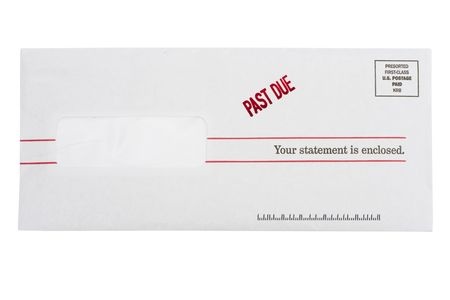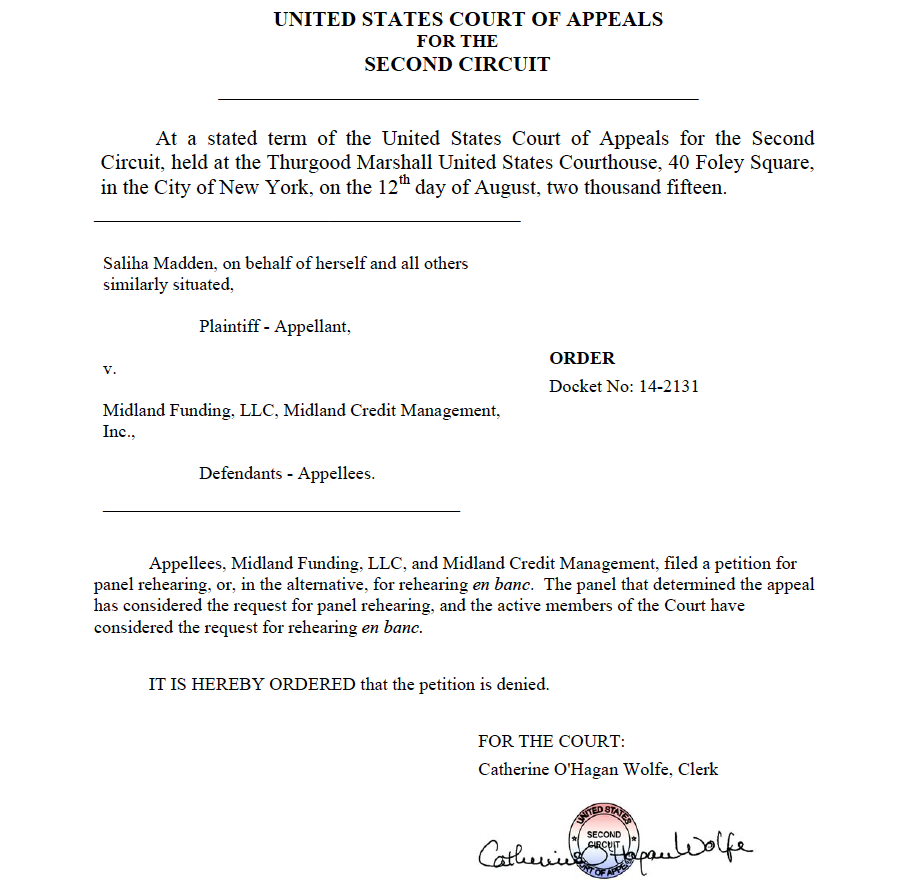Legal Briefs
What Does the Federal Reserve Think About When It Thinks About Alternative Small Business Financing?
August 27, 2015 The Federal Reserve Bank of Cleveland recently published results of a focus group it conducted on alternative small business financing. As part of the paper, the Fed included a brief discussion of some of the questions raised by the study. The considerations discussed offered an interesting glimpse of some the legal issues the Fed is thinking about in relation to alternative small business finance.
The Federal Reserve Bank of Cleveland recently published results of a focus group it conducted on alternative small business financing. As part of the paper, the Fed included a brief discussion of some of the questions raised by the study. The considerations discussed offered an interesting glimpse of some the legal issues the Fed is thinking about in relation to alternative small business finance.
First, the Fed considered the increasing trend of bank referral partnerships and wondered if such referral arrangements raise disparate impact concerns under the Equal Credit Opportunity Act. It asked:
Do issues of disparate treatment arise if banks refer certain customers to their alternative lending partners, but offer traditional loan products to others?
The Fed’s question seems to suggest that a bank’s referral of some customers to alternative lenders over others could potentially be used against the bank in a disparate impact claim. The Fed’s comment is especially noteworthy given the recent Supreme Court decision in Texas Department of Housing and Community Affairs v. The Inclusive Communities Project, Inc. That decision approved the use of the disparate impact theory under the Fair Housing Act. Many observers had hoped the Court would find that such claims could not be brought under the FHA and thereby limit their use under other federal statutes, such as ECOA.
The Fed was also interested in the effect the use of automated underwriting systems is having on small business lending. It asked:
Does the use of automated underwriting raise or address fair lending concerns?
Unfortunately, the Fed did not specify in what ways it believes fair lending laws may be implicated by the use of automated systems. These concerns could include larger societal issues, such as the effect automated systems are having on credit availability. Or they may involve practical considerations, such as how lenders are meeting their disclosure requirements under ECOA given the increasing number of applications reviewed by automated processes.
While these questions are quite preliminary, they offer interesting insight about how regulators are thinking about the industry and the issues they’re focusing on.
Debtor Permitted to Pursue Injunction Against Creditor Even After Creditor Ceases Collection Efforts
August 26, 2015 Debt collection is tricky business. While a creditor would love to be able to recover on their outstanding accounts, they have no desire to incur additional losses. So its understandable that when a creditor encounters a potentially litigious debtor the creditor may, in certain circumstances, decide to cease attempts to collect on the debt rather than risk incurring additional costs in the form of attorney fees. A recent case out of a Louisiana federal court, however, shows that simply ceasing collection efforts may not be enough to avoid litigation.
Debt collection is tricky business. While a creditor would love to be able to recover on their outstanding accounts, they have no desire to incur additional losses. So its understandable that when a creditor encounters a potentially litigious debtor the creditor may, in certain circumstances, decide to cease attempts to collect on the debt rather than risk incurring additional costs in the form of attorney fees. A recent case out of a Louisiana federal court, however, shows that simply ceasing collection efforts may not be enough to avoid litigation.
The case involved allegedly usurious late fees a condominium association charged its member on association dues. Two association members filed a class action lawsuit arguing that the interest rates associated with the fees exceeded Louisiana’s usury cap. The members requested that the court issue an injunction against the association prohibiting it from charging or seeking to collect the allegedly usurious fees.
The association responded by submitting affidavits to the court stating that it was no longer charging its members the fees at issue and that it had ceased collection efforts on all outstanding fees. It argued that because no fees were being assessed or collected, injunctive relief was inappropriate.
The court rejected the association’s argument and permitted the members to pursue their request for the injunction. The court reasoned that because the association’s governing documents had not been revised and still permitted the assessment of the allegedly usurious fees, there still existed a possibility that the association could decide to resume charging and collecting the fees. Therefore, the members were entitled to seek protective relief.
The court’s decision shows that simply ceasing collection efforts on disputed debt may not be sufficient to prevent later litigation costs. Instead, a creditor that believes that it is likely to face a usury challenge may want to consider taking steps to affirmatively disclaim the potentially usurious interest charges or even the entire interest amount altogether. By disavowing its rights to such payments, the creditor may be able to preempt the debtor’s ability to obtain injunctive relief from hypothetical collection efforts.
Case cite: Reyes v. Julia Place Condos., 2015 U.S. Dist. LEXIS 110310 (E.D. La. Aug. 20, 2015)
New York Choice-of-Law Statute Helps Creditor Overcome Usury Defense
August 20, 2015 An alternative litigation financing company provided a California law firm with a $6 million dollar line of credit. When the law firm failed to pay, the finance company filed suit for breach of contract. The contract provided that the parties’ agreement would be governed by New York law.
An alternative litigation financing company provided a California law firm with a $6 million dollar line of credit. When the law firm failed to pay, the finance company filed suit for breach of contract. The contract provided that the parties’ agreement would be governed by New York law.
In response to the complaint, the law firm filed a motion to dismiss. It argued that if the court conducted a choice of law analysis the court would find that New York’s choice of law rules required the application of California law. The law firm argued that once the agreement was examined under California law the agreement would be found unenforceable because it violated California usury law. The finance company countered that the court was prohibited from conducting a choice of law analysis because the parties had agreed that New York law would govern their transaction and that, pursuant to New York statute, the court was required to respect the parties’ choice.
The court agreed with the finance company. It cited New York General Obligations Law § 5-1401, which provides:
The parties to any contract … arising out of a transaction covering in the aggregate not less than two hundred fifty thousand dollars … may agree that the law of this state shall govern their rights and duties in whole or in part, whether or not such contract, agreement or undertaking bears a reasonable relation to this state.
As the contract at issue involved a transaction in excess of $250,000, the court held that sec. 5-1401 required that the parties’ choice of law provision be enforced. The court noted that the statute explicitly prohibited the court from conducting a choice of law analysis even if the contract would ultimately found to be usurious under California law.
After reviewing the parties’ agreement, the court found that the transaction was not usurious under New York law and denied the law firm’s motion to dismiss.
Hamilton Capital VII, LLC v Khorrami, LLP, 2015 N.Y. Misc. LEXIS 2954 (N.Y. Sup. Ct. Aug. 17, 2015)
Participate in Alternative Finance? You Might Want to Start Watching the Supreme Court
August 19, 2015 A trio of cases before the Supreme Court could have far reaching effects on alternative small business finance. Here’s a rundown of what to watch.
A trio of cases before the Supreme Court could have far reaching effects on alternative small business finance. Here’s a rundown of what to watch.
1. Texas Department of Housing and Community Affairs v. The Inclusive Communities Project, Inc. (Decided June 25, 2015)
In this case, the Court was asked to decide whether a disparate impact claim—a legal theory that allows regulators to bring discrimination claims against a defendant even where no intentional discrimination is alleged—could be brought under the Fair Housing Act. Many observers hoped the Court would find that such claims could not be brought under the FHA and nearby limit their use under other federal statutes such as the Equal Credit Opportunity Act. The Court, however, found that disparate impact claims could be brought under the FHA.
How does this affect alternative lenders?
The Dodd-Frank Act gave the CFPB authority to enforce ECOA, which is one of the few fair lending laws that apply to small business lenders. Some legal observers believe that the CFPB could potentially bring disparate impact claims under ECOA against alternative funders that the Bureau believes have engaged in policies that have resulted in discrimination. The Court’s decision may embolden the agency to bring future actions.
2. Hawkins v. Community Bank of Raymore (To be argued October 5, 2015)
ECOA prohibits lenders from discriminating against applicants on the basis of race, color, religion, national origin, sex, marital status, or age. It also requires lenders to provide applicants notice of any adverse actions taken by the lender in relation to the applicants’ request for credit. The Hawkins case asks the Court to decide whether guarantors should be included in the definition of applicant.
How does this affect alternative lenders?
If the Court determines that personal guarantors are included in the definition of applicant, guarantors would be entitled to the same protections and disclosures as business applicants. Lenders would be required to provide the primary business applicant as well as each guarantor with the appropriate adverse action notices in the event of a decline. Implementing procedures to comply with this requirement could require significant investment from alternative lender.
3. Madden v. Midland Funding, LLC (Appeal expected soon)
This case has been widely followed given its potential effects on marketplace lenders that use banks to originate their loans. The Madden court held that the usury preemption provision of the National Bank Act did not apply to non-bank assignees. Midland requested that the 2nd Circuit rehear the case en banc but that request was denied last week. Midland now has 90 days from the date of the denial to petition the Supreme Court to review the 2nd Circuit’s decision.
How does this affect alternative lenders?
As it stands now, Madden is binding in the 2nd Circuit. If the Supreme Court declines to hear the case, the denial will confirm that Madden is settled law. In that event, observers will be closely watching to see what effect Madden has on litigation involving marketplace lending as well as the purchase and sale of bank originated debt in the larger secondary markets. A recent case out of California may provide some early indications.
Madden vs. Midland Funding, LLC: What does it mean for Alternative Small Business Lending?
August 13, 2015 On Friday, May 22, 2015, while the rest of us were gearing up for the long Memorial Day weekend, three judges of the United States Court of Appeals for the Second Circuit quietly issued their decision in Madden v. Midland Funding, LLC. Though issued to little fanfare, the decision, if upheld on appeal—may lead to significant changes in consumer and commercial lending by non-bank entities.
On Friday, May 22, 2015, while the rest of us were gearing up for the long Memorial Day weekend, three judges of the United States Court of Appeals for the Second Circuit quietly issued their decision in Madden v. Midland Funding, LLC. Though issued to little fanfare, the decision, if upheld on appeal—may lead to significant changes in consumer and commercial lending by non-bank entities.
Loans that were previously only subject to the usury laws of a single state may now be subject to more restrictive usury laws of multiple jurisdictions. Commercial transactions that could be affected include short-term loans by a number of alternative small business lenders.
The Case
The plaintiff, Saliha Madden, opened a credit card account with a national bank in 2005. Three years later, Madden’s account was charged off with an outstanding balance. The account was later sold to Midland Funding, LLC, a debt purchaser.
In November 2010, Midland sent a collection letter to Madden’s New York residence informing her that interest was still accruing on her account at the rate of 27% per year. In response, Madden filed a class action lawsuit against Midland and its servicer. In her complaint, Madden alleged that Midland had violated state and federal laws by attempting to collect a rate of interest that exceeded the maximum rate set by New York State’s usury laws. Midland countered that as a national bank assignee, it was entitled to the preemption of state usury laws granted to national banks by the National Bank Act (the “NBA”). The district court agreed with Midland and entered judgment in its favor. Madden appealed to the Second Circuit.
After reviewing the record, the Court of Appeals reversed the district court’s decision. The appellate court found that the NBA’s preemption provision did not apply to Midland as a mere bank assignee. Instead, the court held that in order “[t]o apply NBA preemption to an action taken by a non-national bank entity, application of state law to that action must significantly interfere with a national bank’s ability to exercise its power under the NBA.”
The court explained that the NBA’s preemption protections only apply to non-bank entities performing tasks on a bank’s behalf (e.g. bank subsidiaries, third-party tax preparers). If a bank assignee is not performing a task on a national bank’s behalf, the NBA does not protect the assignee from otherwise applicable state usury laws. Therefore, as Midland’s collection efforts were performed on its own behalf and not on behalf of the national bank that originated Madden’s account, the appellate court found that New York’s usury laws were not preempted and that Midland could be subject to New York’s usury restrictions.
Usury Law Compliance
The Madden decision undermines a method of state usury law compliance that I’ll refer to as the “exportation model”. In a typical exportation arrangement, a non-bank lender contracts with a national bank to originate loans that the lender has previously underwritten and approved. After a deal has been funded, the bank sells the loan back to the lender for the principal amount of the loan, plus a fee for originating the deal.
1F.3d —, 2015 U.S. App. LEXIS 8483 (2d Cir. N.Y. May 22, 2015).
The exportation model allows non-bank lenders to benefit from the preemption protections granted to banks under the NBA. Specifically, the NBA provides that a national bank is only subject to the laws of its home state. This provision allows a bank to ‘export’ the generally less restrictive usury laws of its home state to other states where it does business. As bank assignees, lenders that have purchased loans from a bank are only subject to the laws of the originating bank’s home state. This exemption saves these non-bank lenders from having to engage in a state-by-state analysis of applicable usury laws.
The Madden decision, however, casts doubt on the ability of these non-bank assignees to benefit from the NBA’s preemption protections. The Second Circuit’s decision makes clear that non-bank assignees that are not performing essential acts on a bank’s behalf—which would seem to include alternative small business lenders—are not entitled to NBA preemption and are subject to the usury laws of the bank’s home state as well as any otherwise applicable state’s
usury laws.
Aftermath
While the Court of Appeals’ decision foreclosed Midland’s preemption argument, other issues remained unresolved. Specifically, the circuit court did not decide whether the choice-of-law provision in Madden’s cardholder agreement—which provided that any disputes relating to the agreement would be governed by the laws of Delaware—would prevent Madden from alleging violations of New York State usury law.
 In the district court proceeding, both parties had agreed that if Delaware law was found to apply, the 27% interest rate would be permissible under that state’s usury laws. The district court, however, did not address the choice-of-law issue because the court had found that the NBA’s preemption protections were sufficient grounds upon which to resolve the case. As the issue had not been addressed, the circuit court remanded the case back to the district court to decide which state’s law controlled.
In the district court proceeding, both parties had agreed that if Delaware law was found to apply, the 27% interest rate would be permissible under that state’s usury laws. The district court, however, did not address the choice-of-law issue because the court had found that the NBA’s preemption protections were sufficient grounds upon which to resolve the case. As the issue had not been addressed, the circuit court remanded the case back to the district court to decide which state’s law controlled.
But before sending the case back down, the appellate court made two points worth noting. First, the court stated that “[w]e express no opinion as to whether Delaware law, which permits a ‘bank’ to charge any interest rate allowable by contract…would apply to the defendants, both of which are non-bank entities.” The court’s statement suggests that it may not have completely agreed with the parties that 27% would be a permissible interest rate under Delaware law.
Second, the court highlighted a split in New York case law on the enforceability of choice-of-law provisions where claims of usury are involved. Generally, courts will refuse to enforce a choice-of-law provision if the application of the chosen state’s law would violate a public policy of the forum state. As usury is sometimes considered an issue of public policy, the enforceability of such clauses is commonly a point of contention in usury actions. The cases cited by the Court of Appeals show that some courts in New York have enforced choice-of-law provisions—even where the interest rate permitted by the chosen state would violate New York’s usury laws—while other New York courts have refused to enforce such provisions in light of public policy concerns.
New York, however, is by no means the only state with usury laws that are less than straightforward. The general complexity of state usury laws is evidenced by the circuit court’s hesitation to agree with Madden’s concession that a 27% interest rate would be permissible under Delaware law. The court made clear that an argument could be made that the rate was usurious under both New York and Delaware law.
Madden’s Impact
An important legal principle that was not addressed in either the district or circuit court proceedings is the ‘valid when made’ doctrine of assignment law. The ‘valid when made’ doctrine provides that a loan that is valid at the time it is made will remain valid even if the loan is subsequently assigned. This doctrine may have led to a different outcome in the case had Midland argued it before the district or circuit court. Midland is now appealing the Second Circuit’s decisions and many expect a ‘valid when made’ argument to be a primary point of Midland’s appeal (SEE NOTE BELOW). If this argument is successful, the practical impact of Madden would be greatly diminished.
NOTE: The Second District Court rejected a request to rehear the case. Read that decision here.
In the meantime, the Madden decision will likely increase the importance of choice-of-law analysis in relation to usury law. Assignees that previously relied on the NBA’s preemption provision as a method of state usury law compliance will now need to address the enforceability of their contractual choice-of-law clauses where claims of usury may become an issue. This analysis is often a complex undertaking because states take varying views of what constitutes usury as well as whether or not usury is an issue of public policy.
While the Madden decision may have been published before the long Memorial Day weekend, analyzing its consequences will likely keep many non-bank lenders (and their attorneys) busy, even on their days off.
Madden v. Midland Appeal Rejected
August 13, 2015Alternative lenders might have reason to lose a little bit of sleep going forward. The United States Court of Appeals for the Second Circuit shot down a request for a rehearing of Madden v. Midland. The original ruling stated that third party debt buyers are not covered under National Bank Act pre-emption. That decision had major ramifications for alternative lenders who often rely on banks to issue the loans and then immediately sell them to the “lender” to book and service.
You can read a legal brief of the case here.
Lending Club’s CEO recently addressed this case and he explained that he believed his company would be unaffected because of their choice of law provision.
And Patrick Siegfried, Esq, the author of the Usury Law Blog, has previously said that Madden v. Midland may be the start of new usury Litigation.
Decision below:

Ignoring Cease and Desist Letters – Just Don’t Do It
August 12, 2015 Usury law is complex. It is an area of law heavily burdened with obscure exceptions and antiquated nuances. Yet, one point is clear.
Usury law is complex. It is an area of law heavily burdened with obscure exceptions and antiquated nuances. Yet, one point is clear.
No matter how clear the case law, sophisticated the compliance program or lax the regulator, when a business receives a cease and desist letter from a state or federal authority it must be addressed. To do nothing risks litigation and worse. Case in point is the recent complaint filed by the CFPB against payday lender NDG Financial Corp. and its affiliates.
According to the complaint, NDG received cease and desist letters regarding its lending practices from Michigan (2014), California (2012, 2013, and 2014), Virginia (2013), New Hampshire (2011), Maine (2011), Oregon (2011), and Pennsylvania (2010). And though NDG stopped lending in some of these jurisdictions, it apparently felt confident enough to continue its operations in a number of these states even after receiving the letters. Partly as a result, the Bureau filed suit.
Now, I am in no way suggesting that CFPB will prevail in its claims against NDG or that merely receiving a cease and desist letter is evidence of wrongdoing. As a recent post of mine shows, regulators are often incorrect in their interpretation of usury law. That being said, the number of previous warnings NDG received from state regulators prior to being sued is stunning. So it seems to me that NDG is somewhat responsible for the targeting it has received from the CFPB.
If a lender has received 8 cease and desist letters within a 4 year period, there is a problem. It doesn’t mean it must immediately stop all lending. But it would be wise to undertake a greater review of its operations and, hopefully, generate a plan to address the regulators’ concerns.
Placing one’s head in the sand just won’t cut it.
Renaud Laplanche on Madden v. Midland
August 8, 2015 In case you missed the comments by Lending Club’s CEO regarding the Madden v. Midland decision, we’ve got the transcript of it from the Q2 earnings call below. A brief of that case was published on deBanked back on June 11th by lawyers from Giuliano McDonnell & Perrone, LLP.
In case you missed the comments by Lending Club’s CEO regarding the Madden v. Midland decision, we’ve got the transcript of it from the Q2 earnings call below. A brief of that case was published on deBanked back on June 11th by lawyers from Giuliano McDonnell & Perrone, LLP.
Smittipon Srethapramote – Morgan Stanley
And do you have any comments on the Madden versus Midland funding case that’s going through the court system right now in terms of how it potentially impacts your business?Renaud Laplanche – Founder & CEO
Yes, so we’ve seen that case that came out a couple of months ago. I think the –our take there is obviously the particular circumstances of the case are different from what we’re seeing on our platform. But in general what really helps us apply Utah law to most of our loans is really a couple of things. One is for the all preemption. And the second is choice of law provision in our contract. The Madden case really challenged the federal preemption but did not challenge the choice of law provision, so that’s really the – and we don’t need both, we need one of them. So we continue to operate in the Second Circuit district where that decision was rendered exactly as we did before and are relying on our choice of law provisions.Note that this particular case is getting challenged by a lot of players in the banking industry, including the American Banking Association. And I think it’s an unusual case, but certainly that doesn’t come back to us in that the sense that we continue to rely on choice of law provision. If we were to see that the choice of law provision was getting challenged elsewhere which there’s no reason to expect at this point, we could also think of a different issuance framework than the one we’re using now where we would switch to a series of state licenses. And that’s in [indiscernible] we provided in our slide deck that shows that using the current mix we have about 12.5% of our loans that would exceed the state interest rate caps.
So that certainly would be [indiscernible] demand and we’d have to revise our pricing in certain states, but that certainly would be another option available to us if our choice of law provision and federal preemption was getting challenged in other states.
On July 28th, Attorney Patrick Siegfried pointed out that the Madden case could be the start of a chilling trend after a subsequent ruling in Blyden v. Navient Corp. In that brief, he wrote, “Blyden also demonstrates that debtors that become aware of subsequent assignments of their loans may be inclined to use the assignment event as a way to invalidate otherwise legitimate debts.”





























